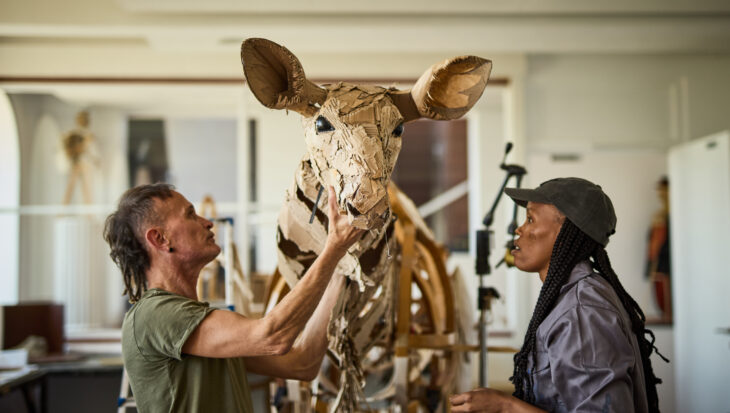‘The Herds’ will be arriving in London this Friday!
Have you heard? A breathtaking arts initiative, ‘The Herds’ will be arriving in London this Friday.
Posted 27 Jun 2025

Posted on the 1st March 2004
BBC Radio 4's Today programme broke the news in January that Cambridge University was abandoning its plans for a massive primate research centre. This followed years of campaigning against the project - at the centre of which was Animal Aid.
The Today item was a gross distortion of the truth of the campaign, with Animal Aid Director Andrew Tyler’s words being heavily edited and the pro-monkey research lobby getting an essentially free hand. In response to our complaint, the BBC have now conceded that they made mistakes and have offered an apology. But it’s a partial apology and some central elements of our complaint have not been upheld. See the BBC’s letter and our response to it, below.



Fraser Steel
Head of Programme Complaints
BBC
Media Centre
Media Village
201 Wood Lane
London W12 7TQ
March 26, 2004
Dear Mr Steel
Today, Radio 4, 27 January 2004-03-21
Thank you for your March 8 letter. Let me say at the outset that I appreciate the trouble you have taken to investigate my complaint. I am also gratified by the points conceded – but extremely disappointed that you have not upheld the central elements of my complaint about the broadcast.
You say that the Inspector’s report was not sufficiently definitive on the question of the scientific argument to include that issue in the piece. I regard that as a wholly unreasonable conclusion. CU failed at the inquiry to make its case that the proposed primate research was in the national interest – which was the test for overriding the Green Belt status of the land earmarked for the project.
It is true that the Inspector found that CU’s bundle of evidence was incomplete but that is a mark of the University’s incompetent, confused and arrogant approach to the inquiry. The fact remains that, after showing early reluctance, CU recognised the importance of winning the scientific argument and submitted a good deal of evidence – mainly at the rebuttal phase of the inquiry. That evidence failed to convince the Inspector. We submitted our own scientific evidence that, in my view, added up to a far more orderly and convincing argument. Let me remind you of this statement from the Inspector’s final report: ‘If one accepts the premise that wherever possible research should not involve animals, it would be a stronger argument to say that it is nationally important to keep together and service the excellent and acknowledged research expertise in Cambridge to catch up on alternative forms of research to that employing animals.’
This was precisely what we argued.
It follows from this that our High Court challenge to the DPM’s decision to over-rule his own Inspector, was absolutely germane and should have been included in the report. You justify omitting that development by claiming that the focus of the piece ‘was on the meaning and significance of the decision’ by CU to abandon its plans. It certainly was not. The piece seemed concerned to re-animate old demons – animal rights campaigners as violent morons – while omitting entirely the true history of the campaign; a campaign that had involved – as well as protests – literally years of diligent engagement with the local council, full involvement in the public inquiry, public meetings and, most recently, a High Court challenge to the Deputy Prime Minister.
It is true that I was heard to say in the item that we demonstrated our case at a public inquiry and won – but in the context of what preceded and followed that statement, no-one could have known the significance of the words I uttered: i.e. that CU were put to the test on the scientific efficacy of the primate model and failed that test. This is an extremely important fact that I should have been allowed to communicate to the Today listeners.
I note that you uphold my complaint that Colin Blakemore was allowed to state – unchallenged – that the objectors’ scientific arguments played no part in the process. This statement by Blakemore was a pernicious falsehood that, when added to the failure of the piece to detail the outcome of the public Inquiry and the fact of our High Court challenge, did real damage. His falsehood cannot simply be treated as a disposable problem.
In summary, I do appreciate the points conceded and the time you have taken on this matter, but we remain extremely disappointed with regard to the aspects that have not been upheld.
The totality of the Today item, in my view, served to create an impression of a victory for the forces of violent, misanthropic nihilism – our key arguments and explanations having been assiduously excised.
Yours sincerely
Andrew Tyler
Director, Animal Aid
Find out more about the campaign against the Cambridge primate research labs.
For the full background, scientific reports and latest news see the Cambridge index.
Have you heard? A breathtaking arts initiative, ‘The Herds’ will be arriving in London this Friday.
Posted 27 Jun 2025

As the greyhound racing industry releases its annual data on the number of dogs’ deaths, a raft of well-known names - alongside their canine friends - has called upon the Government to end greyhound racing....
Posted 26 Jun 2025
